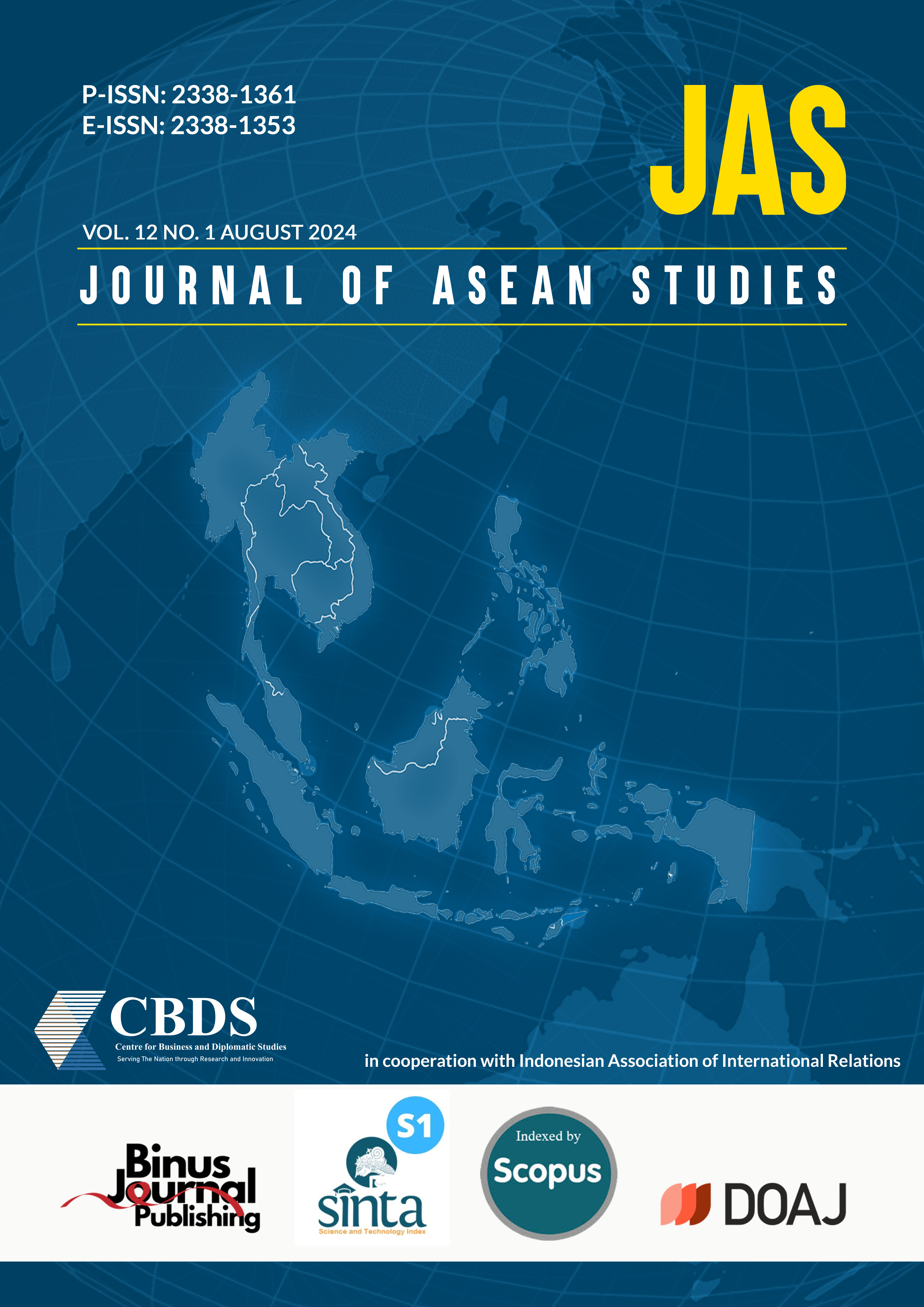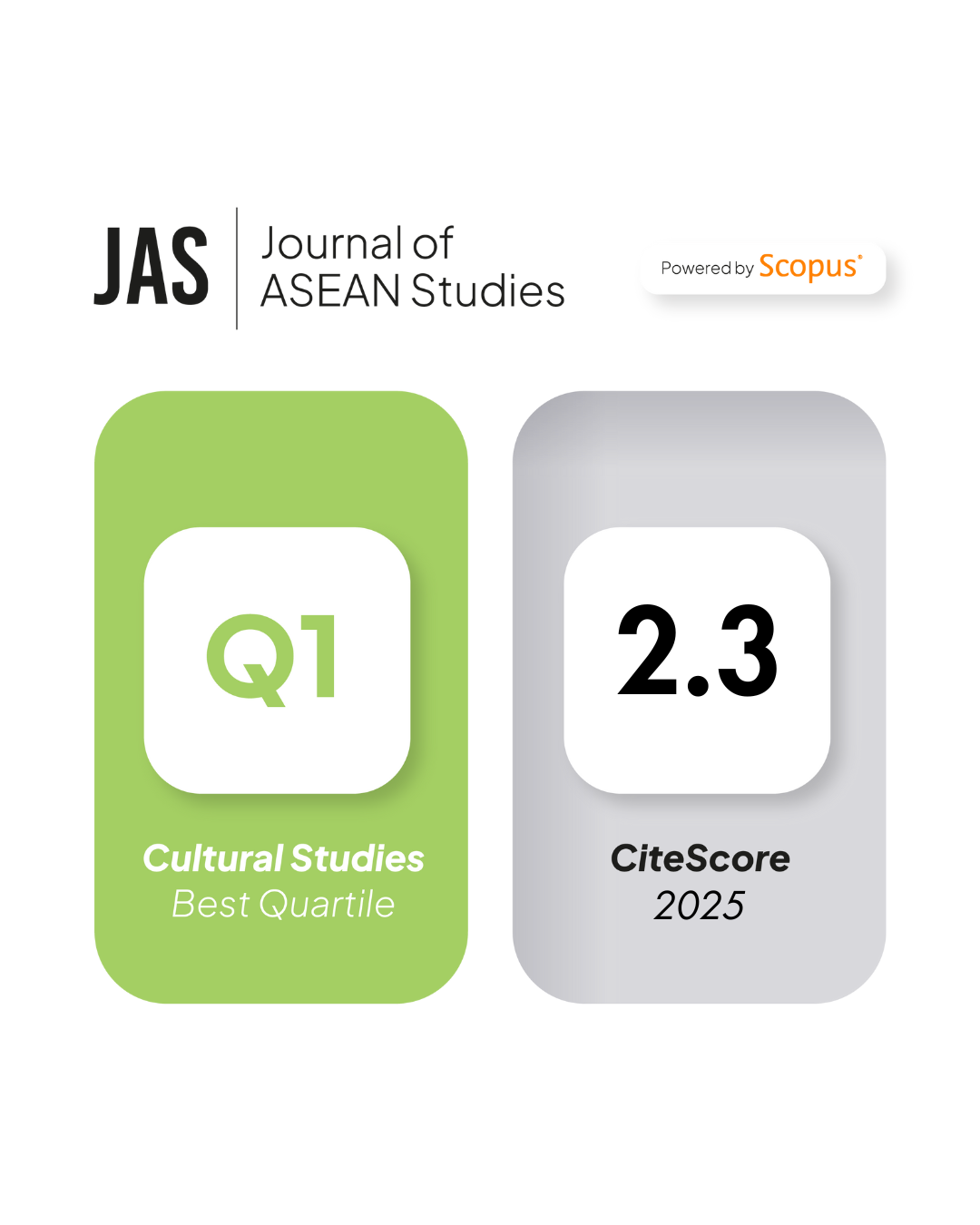Identifying Key Determinants of Civil Society Robustness in Southeast Asia
DOI:
https://doi.org/10.21512/jas.v12i1.9422Keywords:
Southeast Asia, civil society’s robustness, participatory democracy, civil liberty, political stability, neopatrimonialism, beta regressionAbstract
The research examines the key determinants of civil society robustness in Southeast Asia, addressing a significant gap in quantitative research within the region. Utilizing the beta regression model on data spanning from 1986 to 2023, the researcher explores the impact of participatory democracy, civil liberty, political stability, the rule of law, and neopatrimonialism on civil society’s robustness. Moderating effects of GDP per capita, control of corruption, freedom of expression, and digital freedom accessibility are also considered. Findings reveal that participatory democracy and civil liberties significantly enhance civil society’s robustness, whereas political instability tends to undermine it. Surprisingly, neopatrimonialism shows a positive influence, suggesting complex adaptive strategies by civil organizations. Along with the insignificant result of the rule of law, neopatrimonialism challenges conventional views, standing out among the variables analyzed. The research contributes to understanding the multifaceted dynamics of civil society in Southeast Asia, offering insights for policymakers and Civil Society Organizations (CSOs) to foster democratic governance and social justice. It underscores the necessity for region-specific strategies acknowledging the unique political, economic, and cultural landscapes of Southeast Asian countries.
References
Alami, A. N., Luong, D. N. A., Prihatini, E., Ramadhani, E., Go, J. R. R., Hafidzah, N., & Atiyah, U. (2022). Democratization in the digital era: Experience from Southeast Asia. Journal of ASEAN Studies, 10(2), 227−246. https://doi.org/10.21512/jas.v10i2.9361
Aron, R. (1990). Democracy and totalitarianism: A theory of political systems. University of Michigan Press.
Bach, B. C. (2011). Patrimonialism and neopatrimonialism: Comparative trajectories and readings. Commonwealth & Comparative Politics, 49(3), 275−294. https://doi.org/10.1080/14662043.2011.582731
Bernhard, M., Jung, D. J., Tzelgov, E., Coppedge, M., & Lindberg, S. I. (2017). Making embedded knowledge transparent: How the V-Dem dataset opens new vistas in civil society research. Perspectives on Politics, 15(2), 342–360. https://doi.org/10.1017/S1537592717000056
Bobbio, N. (1997). Democracy and dictatorship: The nature and limits of state power. Wiley.
Bratton, M. (1994). 3 civil society and political transitions in Africa. In Civil society and political transition in Africa. Lynne Rienner Publishers.
Bratton, M., & Van de Walle, N. (1997). Democratic experiments in Africa: Regime transitions in comparative perspective. Cambridge University Press.
Brinton, A. (2010). Civil society theory: De tocqueville. In H. K. Anheier, & S. Toepler (Eds.), International encyclopedia of civil society. Springer.
Broers, L. (2005). After the ‘revolution’: Civil society and the challenges of consolidating democracy in Georgia. Central Asian Survey, 24(3), 333–350. https://doi.org/10.1080/02634930500310444
Bünte, M., & Weiss, M. L. (2023). Civil society and democratic decline in Southeast Asia. Journal of Current Southeast Asian Affairs, 42(3), 297–307. https://doi.org/10.1177/18681034231212488
Callen, T. (2024). Gross domestic product: An economy’s all. International Monetary Fund. https://www.imf.org/en/Publications/fandd/issues/Series/Back-to-Basics/gross-domestic-product-GDP
Case, W. (2002). Politics in Southeast Asia: Democracy or less. Curzon.
Chandoke, N. (1995). State and civil society: Explorations in political theory. Sage Publications.
Chaney, P. (2016). Civil society and gender mainstreaming: Empirical evidence and theory-building from twelve post-conflict countries 2005–15. World Development, 83, 280–294. https://doi.org/10.1016/j.worlddev.2016.01.010
Charnovitz, S. (1996). Participation of non-governmental organizations in the world trade organization. University of Pennsylvania Journal of International Economic Law, 17(1), 331–357.
Clapham, C. (1985). Third world politics: An introduction. Routledge.
Cohen, J. L., & Arato, A. (1992). Civil society and political theory. The MIT Press.
Coppedge, M., Lindberg, S. I., Skaaning, S. E., & Teorell, J. (2015). Measuring high level democratic principles using the V-Dem data [Working paper]. University of Gothenburg. https://www.v-dem.net/media/publications/v-dem_working_paper_2015_6.pdf
Cribari-Neto, F., & Zeileis, A. (2010). Beta Regression in R. Journal of Statistical Software, 34(2), 1–24. https://doi.org/10.18637/jss.v034.i02
Curley, M. (2018). Governing civil society in Cambodia: Implications of the NGO law for the “rule of law”. Asian Studies Review, 42(2), 247–267. https://doi.org/10.1080/10357823.2018.1457624
Edwards, M. (2019). Civil society (4th ed.). Polity.
Ferrari, S., & Cribari-Neto, F. (2004). Beta regression for modelling rates and proportions. Journal of Applied Statistics, 31(7), 799–815. https://doi.org/10.1080/0266476042000214501
Fowler, A. (2000). Civil society, NGDOs and social development: Changing the rules of the game (Geneva 2000 occasional paper). United Nations Research Institute for Social Development (UNRISD).
Ganesan, N. (2015). Civil Society and Democratic Evolution in Southeast Asia. In N. Ganesan, & C. Dürkop (Eds.), Civil society and democracy in Southeast Asia and Turkey. Konrad-Adenauer-Stiftung.
Garcia, L. B. (2015). Participatory democracy and civil society in the EU: Agenda-setting and institutionalisation. Palgrave Macmillan.
Gemmill-Herren, B., & Bamidele-Izu, A. (2002). The role of NGOs and civil society in global environmental governance. In D. C. Esty, & M. H, Ivanova (Eds.), Global environmental governance: Options & opportunities. Yale School of Forestry & Environmental Studies
Gerard, C. (2014). ASEAN and civil society activities in ‘created spaces’: The limits of liberty. The Pacific Review, 27(2), 265–287. https://doi.org/10.1080/09512748.2014.882395
Goh, D. P. S. (2015). Colonialism, neopatrimonialism, and hybrid state formation in Malaysia and the Philippines. In Patrimonial capitalism and empire (pp. 165-190). Emerald Group Publishing Limited. https://doi.org/10.1108/S0198-871920150000028007
Hann, C., & Dunn, E. (Eds.) (1996). Civil society: Challenging western models. Routledge.
Hansson, E., & Weiss, M. L. (2023). Routledge handbook of civil and uncivil society in Southeast Asia. Routledge.
Heinrich, V. F. (2005). Studying civil society across the world: Exploring the thorny issues of conceptualization and measurement. Journal of Civil Society, 1(3), 211–228. https://doi.org/10.1080/17448680500484749
Hill, L. (2010). Civil society theory: Smith. In H. K. Anheier, & S. Toepler (Eds.), International encyclopedia of civil society. Springer. https://doi.org/10.1007/ 978-0-387-93996-4_527
Howell, J., & Pearce, P. (2001). Civil society and development: A critical exploration. Lynne Rienner.
Hutchcroft, P. D. (1991). Oligarchs and cronies in the Philippine state the politics of patrimonial plunder. World Politics, 43(3), 419–450. https://doi.org/10.2307/2010401
Inglehart, R., & Baker, W. E. (2000). Modernization, cultural change, and the persistence of traditional values. American Sociological Review, 65(1), 19–51. https://doi.org/10.1177/000312240006500103
Jacobsson, K., & Korolczuk, E. (Eds.) (2017). Civil society revisited: Lesson from Poland. Berghahn Books.
Jones, S. F. (2006). The Rose Revolution: A revolution without revolutionaries? Cambridge Review of International Affairs, 19(1), 33–48. https://doi.org/10.1080/09557570500501754
Kaiser, Z. R. M. A. (2020). Civil society, political stability and peace-building in Bangladesh and Sri Lanka: A comparative study. In M. N. Momen, R. Baikady, C. Sheng Li, & M. Basavaraj (Eds.), Building sustainable communities. Palgrave Macmillan. https://doi.org/10.1007/978-981-15-2393-9_27
Kalm, S., & Uhlin, A. (2015). Civil society and the governance of development: Opposing global institutions. Palgrave Macmillan.
Kamstra, J., Pelzer, B., Elbers, W., & Ruben, R. (2016). Constraining is enabling? Exploring the influence of national context on civil society strength. VOLUNTAS: International Journal of Voluntary and Nonprofit Organizations, 27, 1023–1044. https://doi.org/10.1007/s11266-016-9697-0
Katz, H. (2010). Civil society theory: Gramsci. In H. K. Anheier, & S. Toepler (Eds.), International encyclopedia of civil society. Springer. https://doi.org/10.1007/978-0-387-93996-4_23
Kaufmann, D., & Kray, A. (2023). Worldwide governance indicators. World Bank Group. https://www.worldbank.org/en/publication/worldwide-governance-indicators
Keane, J. (1999). Civil society: Old images, new visions. Stanford University Press.
Klein, A. (2010). Civil society theory: Hegel. In H. K. Anheier, & S. Toepler (Eds.), International encyclopedia of civil society. Springer. https://doi.org/10.1007/978-0-387-93996-4_92
Laskar, M. (2013). Summary of social contract theory by Hobbes, Locke and Rousseau. SSRN. http://dx.doi.org/10.2139/ssrn.2410525
Lipset, S. M. (1994). The social requisites of democracy revisited: 1993 presidential address. American Sociological Review, 59(1), 1–22.
McCullagh, P., & Nelder, J. A. (1989). Generalized linear models. Routledge.
Mechkova, V., Pemstein, D., Seim, B., & Wilson, S. (2019). Measuring Internet politics: Introducing the Digital Society Project [Working paper]. https://digitalsocietyproject.org/wp-content/uploads/2019/05/DSP_WP_01-Introducing-the-Digital-Society-Project.pdf
Meidinger, E. (2002). Law making by global civil society: The forest certification prototype. SSRN. https://dx.doi.org/10.2139/ssrn.304924
Mercer, C. (2002). NGOs, civil society and democratization: a critical review of the literature. Progress in Development Studies, 2(1), 5–22. https://doi.org/10.1191/1464993402ps027ra
Muskhelishvili, M., & Jorjoliani, G. (2009). Georgia’s ongoing struggle for a better future continued: Democracy promotion through civil society development. Democratization, 16(4), 682–708. https://doi.org/10.1080/13510340903083000
O’Donnell, G. (2005). Why the rule of law matters. In L. J. Diamond and L. Morlino (Eds.), Assessing the quality of democracy (pp. 3–17). Johns Hopkins University Press.
Pemstein, D., Marquardt, K. L., Tzelgov, E., Wang, Y. T., Medzihorsky, J., Krusell, J., Miri, F., & Von Römer, J. (2022). The V–Dem measurement model: Latent variable analysis for cross-national and cross-temporal expert-coded data [Working paper]. University of Gothenburg. https://www.v-dem.net/media/publications/Working_Paper_21.pdf
Putnam, R. D., Leonardi, R., & Nonetti, R. Y. (1993). Making democracy work: Civic traditions in modern Italy. Princeton University Press.
Riaz, A., & Rahman, M. S. (Eds.) (2016). Routledge handbook of contemporary Bangladesh. Routledge.
Salamon, L. M., & Toepler, S. (2000). The influence of the legal environment on the development of the nonprofit sector [Working paper]. Johns Hopkins University Center for Civil Society Studies.
Schmidt J. (2010). Civil society theory: Kant. In H. K. Anheier, & S. Toepler (Eds.), International encyclopedia of civil society. Springer. https://doi.org/10.1007/978-0-387-93996-4_522
Seligman, A. (1992). The idea of civil society. Simon and Schuster.
Sidel, M. (2011). Civil society and civil liberties. In M. Edwards (Ed.), The Oxford handbook of civil society (pp. 298–310). Oxford University Press.
Sinpeng, A., & Koh, Y. (2022). Journalism in the age of digital autocracy: A comparative ASEAN perspective. Journal of ASEAN Studies, 10(2), 247–262. https://doi.org/10.21512/jas.v10i2.9162
Stefes, C. H. & Paturyan, Y. J. (2021). After the revolution: State, civil society, and democratization in Armenia and Georgia. Frontiers in Political Science, 3, 1–13. https://doi.org/10.3389/fpos.2021.719478
Thompson, M. R. (2015). Civil society and democracy: Towards a taxonomy. In N. Ganesan, & C. Dürkop (Eds.), Civil society and democracy in Southeast Asia and Turkey. Konrad-Adenauer-Stiftung.
Uhlin, A. (1997). Indonesia and the “third wave of democratization”: The Indonesian pro-democracy movement in a changing world. St. Martin’s Press.
Uphoff, N., & Krishna, A. (2004). Civil society and public sector institutions: More than a zero‐sum relationship. Public Administration and Development, 23(4), 357–372. https://doi.org/10.1002/pad.313
Walton, O. (2015). Humanitarian NGOs: Dealing with authoritarian regimes [Working paper]. University of Bath, Centre for Development Studies (CDS). http://hdl.handle.net/10419/128137
Warren, M. E. (2000). Democracy and association. Princeton University Press.
Weiss, M. L. (2023). Civil society’s inconsistent liberalism in Southeast Asia: Exercising accountability along differing diagonals. Journal of Current Southeast Asian Affairs, 42(3), 308–327. https://doi.org/10.1177/18681034231208021
Wheatley, J. (2010). Civil society in the Caucasus: Myth and reality. Caucasus Analytical Digest. https://css.ethz.ch/publikationen/externe-publikationen/details.html?id=/c/i/v/i/civil_society_in_the_caucasus
World Bank. (2023). World development indicators: GDP per capita. https://databank.worldbank.org/source/world-development-indicators
Ziegler, C. E. (2010). Civil society, political stability, and state power in Central Asia: cooperation and contestation. Democratization, 17(5), 795–825. https://doi.org/10.1080/13510347.2010.501172
Downloads
Published
How to Cite
Issue
Section
License
Copyright (c) 2024 Maulana Amrullah

This work is licensed under a Creative Commons Attribution-NonCommercial 4.0 International License.


























